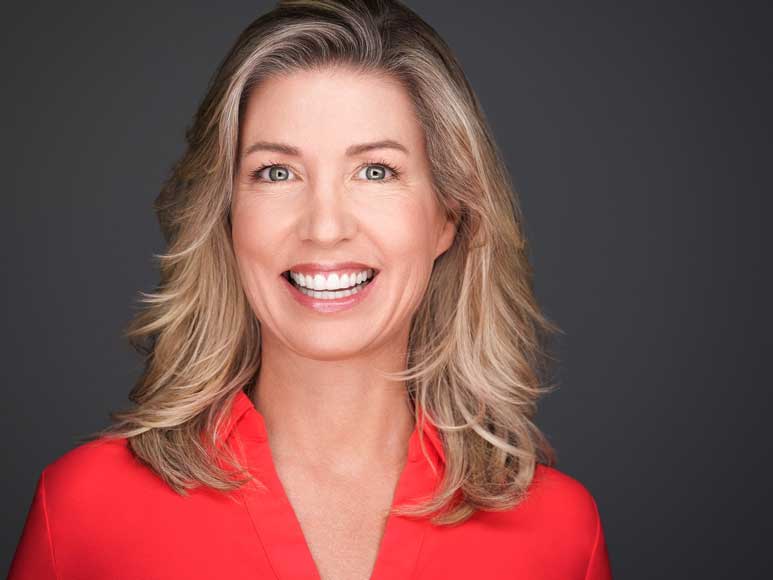On a Winding Path to Reinsurance: An Interview with Christine Hofbeck
By Ronald Poon Affat
Reinsurance News, April 2023

Christine Hofbeck began her actuarial career in retirement consulting, but after a few decades, a few practice areas, a bestselling book and a stint on a reality television show, she found herself in the world of reinsurance. Reinsurance News talked with her to learn more about her background, her advice to other actuaries, and her outlook on the future of the profession.
Ronald Poon Affat (RPA): Tell us a bit about your actuarial career experience.

Christine Hofbeck, FSA, is vice president, Actuarial Development at Fortitude Re.
Christine Hofbeck (CH): I began my career in the mid- ‘90s at an employee benefits consulting firm called Kwasha Lipton. What a special place. I worked tirelessly, earned my FSA and EA, and learned so much. Eventually the company was sold, reorganized, and resold several times in short order, and the magic felt gone. After a decade of actuarial consulting, I walked away from a big job to become a stay-at-home mom to my three kids.
Fast forward six or seven years. I felt the pull to return to the actuarial work that I loved. I re-emerged in the P&C world, tasked with building the predictive analytics capabilities for AIG Consumer Lines. Here I became known as a builder/fixer. I was no longer immersing myself in spreadsheets, data, results, and technical actuarial work. Instead, I was refining high-level business strategies, building functions and capabilities, and refocusing people and technology to create more efficient and financially beneficial outcomes. This was a change from the technical, but still hugely rewarding and impactful.
I eventually moved back to my Life roots, taking a role at Prudential Group Insurance as head of Pricing and Predictive Analytics. I simultaneously went to graduate school to get my MBA. While working full time and raising three kids, I was flying back and forth from New Jersey to Massachusetts weekly or bi-weekly to attend classes at MIT. I didn’t sleep much during this time! But I loved it all, nonetheless. Pru and I did some great work together. We unfortunately parted ways when I got the Survivor gig (more on that later).
I did a short stint at The Standard as engagement lead for their complete actuarial transformation. And ultimately, all of this rich experience positioned me well for my current role as vice president of Actuarial Development at Fortitude Re.
RPA: How so?
CH: Over the years I’ve been immersed in products and companies and policies and people. I’ve tackled both traditional and non-traditional roles. I’ve witnessed the brilliance and creativity in actuaries that can thrive in the right environment. If you know me, you know that I’m often shouting out the beauty of this profession and the outstanding qualities of our people. It fits that I’d put that all together into driving both Life and P&C actuaries, across products and roles, toward excellence.
Enter Fortitude Re.
Fortitude Re is one of the world’s leading providers of legacy reinsurance solutions, providing bespoke transactional solutions for legacy Life & Annuity and P&C insurers. Here, I’m heading up the full life cycle of actuarial development—the intern program, hiring, student program, continuing education, rotations, leadership development, succession planning, and more. I think of this as, “How do we ensure that our actuaries are poised to create the best solutions and outcomes for our company and customers? How do we best keep them engaged and learning and thriving and growing? How do we drive a continued culture of excellence for ourselves, our teams, our company, and our work?” Fortitude Re was very forward thinking in creating this new role, fully understanding that the actuaries are the driving force of the business. We have strong leadership backing and support. I do believe that what we are creating may be a model for the industry.
RPA: Many people know you as “the actuary who played Survivor.” Tell us about that experience.

“The Past Will Eat You Alive”—Christine “Chrissy” Hofbeck competes on the fifth episode of Survivor 35 on the CBS Television Network. Photograph: Robert Voets/CBS.
CH: Survivor debuted on CBS in May 2000. Twenty-three years and forty-four seasons later, it still ranks as one of CBS’s top shows and in the top 20 across all networks, according to Nielson ratings. I’ve been a fan from the start, completely enthralled with the adventure, extreme strategy, complex relationships, and deep physical and mental toll. How far can we push ourselves to win a game and a million dollars?
I submitted my first application in spring of 2001. I didn’t get a response. I continued barraging Survivor casting with applications almost every year (and sometimes multiple times a year) until they finally called me in early 2015. I was being considered for Season 32: Brains vs Beauty vs Brawn but was dropped partway through the casting process. I was devastated. But I didn’t give up. I applied again. And again.
My phone finally rang in fall 2016. This time was the charm. In the spring of 2017, I found myself living the dream alongside 17 strangers in Fiji, on Survivor Season 35: Heroes vs Healers vs Hustlers. Persistence pays off! I won’t spoil my placement—if you want to watch the season you can stream it on Paramount Plus or Amazon Prime. There’s also a DVD available.
I gained some notoriety in the actuarial world because on the show, I often talked about being an actuary. I explained how my actuarial training helped me predict what might happen next. My predictions were spot on. “I’m an actuary and here’s how actuaries think about this. …” “I’m an actuary so …” There was one scene that generated a lot of attention when I did some math on the fly. It was super easy math, truly. My cast mates called me a “mastermind” after that.
We actuaries are ALL masterminds!
I highly encourage each of you to go after all your big and little and tame and wild dreams. Yes, even the ones that feel outlandish. Heck, I was a 46-year-old mom and actuary who spent six weeks living on a beach in Fiji playing a game for a million dollars. Life can be crazy like that.
RPA: But when you returned, you didn’t go back to work.
CH: No.
RPA: Why not?
Partly this was logistics. I was under contract to not reveal my participation on the show until after the CBS cast announcement that was coming months later. So, finding a new position was somewhat impossible if I planned on being truthful (which, ethically, was important to me). But also, I was ready for a break in the action. One of the many beautiful things about actuarial credentials is that it can be easier to find employment after breaks in service. We’ve proven through exams that we are smart, dedicated, and hard working. That credential opens a lot of doors.
Instead, I went on the keynote speaking circuit—using my Survivor experience as a fun backdrop to professional continuing education sessions and sharing more broadly a framework that I dubbed “Winning Conditions.” The topic caught on. Word of mouth speaking referrals filled my calendar with gigs, and after my presentations I’d get countless emails from attendees sharing their own stories of winning conditions. “Please write a book,” they’d say. “We need more winning conditions!”
And so, I did.
My couple decades of work experiences along with study at MIT and years of research culminated in a nonfiction business book: “Winning Conditions: How to Achieve the Professional Success You Deserve by Managing the Details That Matter.” It was picked up by a literary agent in three days and sold to a publisher (Simon & Schuster) in two weeks. It’s now sold on four continents in three formats and two languages. Upon release it was named an Amazon Hot New Release and then garnered a best-seller flag. Actuaries can do anything!
RPA: And now, reinsurance.
CH: Yes. I mentioned earlier that here at Fortitude Re, actuaries are the driving force of what we do. The focus on excellence appealed to me. No liability is too complex. We have the dynamic environment of a consulting firm with the stability of an insurance company. We’re simultaneously a closed block reinsurance operation with more than $70 billion in assets under management and also a start-up. We aren’t bogged down with legacy systems and legacy processes. Our people are empowered at every level. It’s as if I’ve spent my career meandering through opportunities that have each, in their own way, prepared me for this gig in reinsurance, where I’m tasked with creating a culture of rock star actuaries.
I believe in actuaries. We can do big things.
RPA: There’s a lot of talk these days about actuaries, automation, and data scientists. What’s your opinion on our future and ability to co-exist? Is the future of the actuarial profession at risk?
CH: We should not feel threatened by data science or automation.
Yes, our world is changing at an unprecedented rate and that includes the movement toward automation. Many tasks historically completed by actuaries (think: data clean up and manipulation) can and should now be done by machines. But while the knee-jerk reaction is to think this means fewer actuaries, instead consider that automation will actually up-level us. It will be our actuarial judgment that becomes even more critical. We are uniquely poised to direct, understand, and interpret the automated tasks, influencing the most important business decisions by identifying the “now what?” and “so what?”
As for data scientists, they can be a beautiful complement to our actuarial work. Data scientists are trained to leverage incredibly large data sets efficiently to gain new insights and enhance accuracy of predictions. But it is the actuary’s knowledge of the data, business, regulations, customers, business purpose and underlying ethical structure (i.e., “I know we can, but does that mean we should?”) that are necessary to ensure the models are appropriate.
When we think about reinsurance specifically, the overlap with data scientists feels less urgent. The nature of limited data in a reinsurance arrangement means that many data science techniques meant for massive datasets may be irrelevant. In fact, the actuary’s ability to deal with ambiguity and exhibit good judgment in the absence of more and/or better data becomes ever more critical.
RPA: How do you think actuaries can stay relevant in our changing world?
CH: First, we need to keep challenging and stretching ourselves. Our exams and our work experience teach us how to measure risk, how to think about data, and how to develop creative solutions to complex problems. Moving through teams, products, and practice areas can help us develop new ways to apply what we’ve already learned. Apply for that new role within your company. Seek a rotation. Ask for a short-term assignment. Find a better way to do something you’ve done the same way for many years. What new problems can we solve well for our customers and society?
Second, we need to share our great value more broadly with the world. Here we are, ensuring the financial security of multi-millions of people, and many people have no idea what an actuary even does. Let’s share our great value. Brag a little. Look what we solved! Look what we are doing for society! Tell your family what you do. Tell your friends. Volunteer to work at a high school career fair. Write a white paper. Write a blog. Volunteer for the SOA—there are a great many opportunities available to advance the profession. Remember that we are doing big things.
Lastly, we need to accept that the world is changing, and we need to change with it. Getting comfortable with change can be a difficult muscle to flex. We need to flex.
We can do this.
RPA: Any last thoughts to share?
CH: Thanks for welcoming me into the world of reinsurance. I think I’m going to like it here.
Statements of fact and opinions expressed herein are those of the individual authors and are not necessarily those of the Society of Actuaries, the newsletter editors, or the respective authors’ employers.
Ronald Poon Affat, FSA, is head of Life & Health at IRB Re. He can be reached at ronald.affat@irbre.com.
Christine Hofbeck, FSA, is vice president, Actuarial Development at Fortitude Re. She can be reached at Christine.Hofbeck@Fortitude-Re.com.
